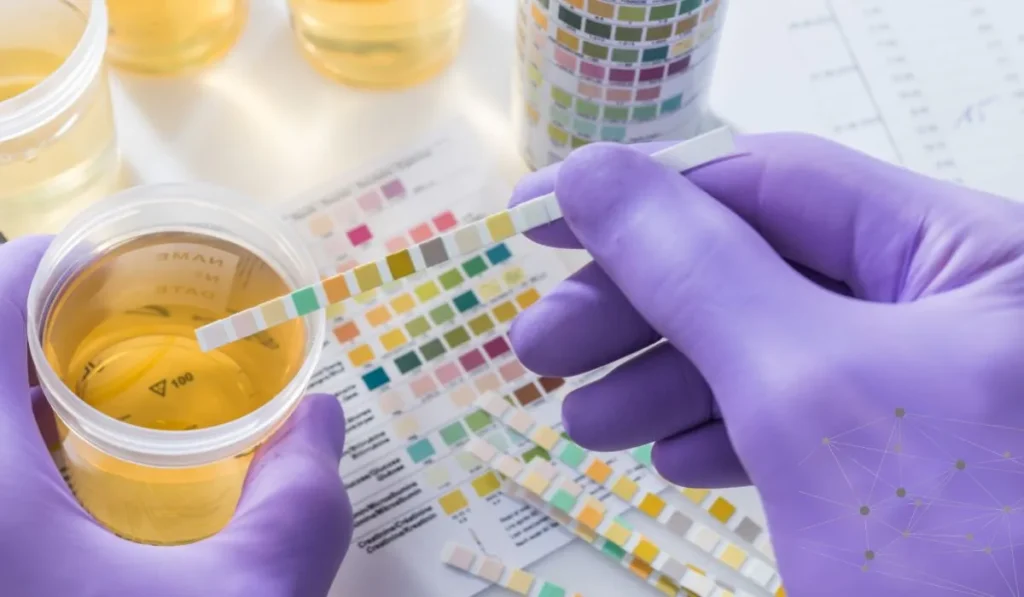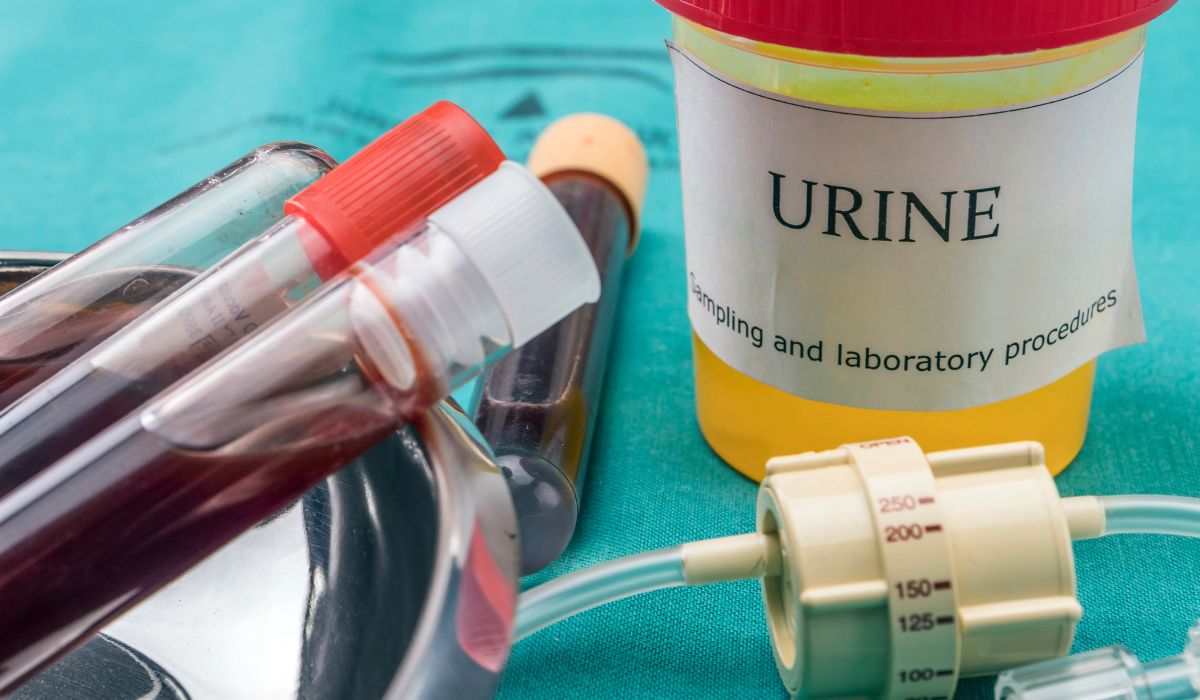What Is Ethyl Sulfate?
Ethyl sulfate is a metabolite. That means it is something your body makes when it breaks down a substance—in this case, ethanol (also known as alcohol). When someone drinks beer, wine, or any drink with alcohol, the body changes it into new chemicals. One of those is ethyl sulfate.
This metabolite is found in urine and is used as a biomarker to show if someone drank alcohol. A biomarker is a sign your body gives that something has happened—like drinking alcohol.
Why Is Ethyl Sulfate in Urine Important?
Finding ethyl sulfate in urine is important for many reasons:
- It shows alcohol intake, even after the alcohol is gone from your breath or blood.
- It helps doctors, labs, and forensic science experts check for substance abuse.
- It is used in places like hospitals, medical laboratories, and emergency departments.
- It helps monitor people during alcohol detoxification or relapse treatment.

How Is Ethyl Sulfate Made in the Body?
When you drink alcohol, it goes through a metabolic pathway in the liver. Here’s what happens:
- Ethanol enters your body.
- The liver uses alcohol dehydrogenase to change ethanol into acetaldehyde.
- Then another enzyme changes acetaldehyde into acetic acid.
- But in some cases, ethanol also changes into ethyl sulfate and ethyl glucuronide (EtG).
- These two are sent out of the body through urination—they are found in urine tests.
How Is Ethyl Sulfate Detected?
Doctors or lab workers use urinalysis to look for ethyl sulfate. Some of the tools they use include:
- Mass spectrometry and tandem mass spectrometry: These tools find tiny bits of chemicals in fluid like urine or whole blood.
- Gas chromatography and electrospray ionization: These help sort and quantify the ethyl sulfate.
- Immunoassay and ELISA (enzyme-linked immunosorbent assay): These are tests that react to certain proteins or chemicals.
- Chromatography and capillary electrophoresis: These methods separate different chemicals in a mixture.
These tests are done in a clinical laboratory and follow special rules, like the Clinical Laboratory Improvement Amendments (CLIA).

What Can Affect the Test Results?
Several things can change the test results:
- Using mouthwash, hand sanitizer, or medicine with alcohol.
- Eating foods made by fermentation, like sauerkraut or juice with bacteria.
- Your diet, medication, and even gender can affect the detection limit.
Lab workers also check for sensitivity and specificity, which means how well the test finds ethyl sulfate and how often it avoids mistakes.
How Long Does Ethyl Sulfate Stay in the Body?
Ethyl sulfate can stay in urine for up to 80 hours after someone drinks alcohol. That makes it a useful way to check for drinking, even if the person doesn’t seem drunk anymore. It lasts longer than a breathalyzer or blood test.
Ethyl Sulfate vs. Ethyl Glucuronide (EtG)
Ethyl sulfate and ethyl glucuronide both show that someone drank alcohol. They’re like a team. EtG is made using glucuronosyltransferase, and it is often tested at the same time as ethyl sulfate.
Both help in:
- Forensic toxicology
- Pain management
- Mental health treatment
- Opioid programs
- Primary care evaluations
When Is Ethyl Sulfate Testing Used?
Ethyl sulfate tests are used in many situations:
For People in Treatment
People going through alcohol detox or pain management programs may be tested to stay on track.
In Pregnancy
Doctors may check for alcohol use during pregnancy to protect the fetus.
In Teens or Kids
Sometimes, meconium (a baby’s first poop) is tested for signs of alcohol exposure before birth.
In the Lab
Ethyl sulfate testing is used in research and epidemiology studies. Many studies can be found in PubMed or Oxford University Press.
In the Courtroom
Forensic science experts use these tests to support or deny claims of alcohol use, even in autopsy cases.
What Does a Positive Test Mean?
A positive test means ethyl sulfate was found in the urine. This means the person has drunk alcohol recently. It does not show how much they drank but can help spot if someone is hiding alcohol use.
Doctors may use this test to:
- Help treat type 2 diabetes with safe alcohol limits.
- Prevent relapse in recovery.
- Guide nutrition and diet plans.
What Is the Role of the Urinary System?
The urinary system helps the body get rid of waste, like ethyl sulfate. After alcohol is broken down in the liver, ethyl sulfate travels through the kidneys and exits in the urine.
Can Anything Cause a False Positive?
Yes. Some medications, foods, or products with alcohol might cause false positives:
- Hand sanitizers
- Some mouthwashes
- Foods with glucose and bacteria that make alcohol
- Some forms of sugar, carbohydrates, or even oleic acid and lipid-rich foods
That’s why labs check correlation between test results and a patient’s health care record.
Are There Risks or Side Effects?
The test itself is safe. It just needs a fluid sample, usually urine. But a false positive can cause stress or confusion. That’s why it’s important that trained people use the test and follow up with good data, other assays, or more quantification tests.
How Accurate Is the Test?
The test is very good at spotting alcohol use. But labs must control the:
- Ratio of ethyl sulfate to urine.
- Detection limit (the smallest amount it can find).
- Standardization across labs.
The test is trusted in both clinical trials and real-world use.
What Do Scientists Use in the Lab?
In in vitro studies (in the lab, not in the body), researchers use tools like:
- Electrophoresis
- Chromatography
- Formic acid and aqueous solutions
- Rat or escherichia coli (E. coli) samples
- Protein, substrate, and transferase reactions
- Cotinine, methanol, or morphine mixtures
They study how ethyl sulfate works with muscle, organ, or molecular biology samples.

FAQs About Ethyl Sulfate in Urine
What is ethyl sulfate in urine?
Ethyl sulfate is a metabolite your body makes after drinking alcohol. It shows up in urine and helps test for alcohol use, even days later.
How long does ethyl sulfate stay in your system?
Ethyl sulfate can stay in your urine for up to 80 hours after your last drink. That makes it great for catching recent alcohol use.
Can food or hand sanitizer cause a positive result?
Yes. Some things like mouthwash, hand sanitizer, and foods with fermentation can cause small amounts of alcohol in your system, leading to a false positive.
Is the test accurate?
Yes. Ethyl sulfate tests are very accurate. They use tools like mass spectrometry and ELISA to check for even small amounts in urine.
Is ethyl sulfate the same as a breathalyzer test?
No. A breathalyzer checks how much alcohol is in your breath right now. Ethyl sulfate tests look for biomarkers in urine that stay longer after drinking.
If you’re going through treatment, working with a primary care doctor, or just curious about how your body handles ethanol, learning about ethyl sulfate in urine is a great place to start. It’s a helpful tool in science, health, and even the courtroom.
For more help, talk to your doctor or a clinical laboratory. They can guide you through safe alcohol habits, testing, and mental health support.








